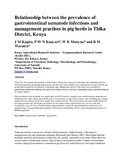| dc.contributor.author | Kagira, J M | |
| dc.contributor.author | Kanyari, P W N | |
| dc.contributor.author | Munyua, W K | |
| dc.contributor.author | Waruiru, R M | |
| dc.date.accessioned | 2013-06-13T15:24:55Z | |
| dc.date.available | 2013-06-13T15:24:55Z | |
| dc.date.issued | 2008 | |
| dc.identifier.citation | J M Kagira, P W N Kanyari, W K Munyua and R M Waruiru (2008). Relationship between the prevalence of gastrointestinal nematode infections and management practises in pig herds in Thika District, Kenya. Livestock Research for Rural Development 20 (10) | en |
| dc.identifier.uri | http://www.lrrd.cipav.org.co/lrrd20/10/kagi20161.htm | |
| dc.identifier.uri | http://erepository.uonbi.ac.ke:8080/xmlui/handle/123456789/33370 | |
| dc.description.abstract | Thirty five (35) commercial pig herds in Thika District, Kenya were surveyed to determine the relationship between nematode parasitism and management practices. In each herd, faecal samples were collected from 25 pigs in all the age groups and examined for the presence of nematode eggs. Management factors of the herds were recorded by a questionnaire administered during visits and its association with the occurrence of nematode species examined using the chi-square analysis.
High prevalence of the nematode was significantly (p<0.05) related to irregular worm control program, dung removal and disinfection. Other significant (p<0.05) factors were presence of non-concrete floors, lack of bedding, late weaning, small herds sizes and provision of low quality non-commercial feeds. These associations were most significant for the Oesophagostomum spp. The highest prevalences of Oesophagostomum spp/Trichuris suis, Ascaris suum and Strongyloides ransomi were recorded in farms using piperazine, levamisole and fenbendazole, respectively. The epidemiology of the gastrointestinal nematodes is discussed in relationship with the various management practices in different pig herds. | en |
| dc.language.iso | en | en |
| dc.title | Relationship between the prevalence of gastrointestinal nematode infections and management practises in pig herds in Thika District, Kenya | en |
| dc.type | Article | en |
| local.publisher | Kenya Agricultural Research Institute – Trypanosomiasis Research Centre (KARI-TRC) | en |
| local.publisher | Department of Veterinary Pathology, Microbiology and Parasitology, University of Nairobi | en |

